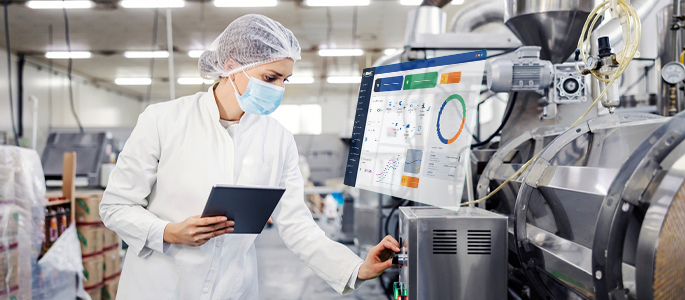
Traceability is the ability to verify the location, history, and application of products by accurately recording and documenting them throughout the supply chain. In food manufacturing, it allows food products to be tracked at every stage—from raw materials to finished goods—ensuring proper documentation and making it easier to identify the source of ingredients, packaging, and additives.
Complete visibility into recorded lot properties for ingredients, components, and finished goods is critical for maintaining full transparency across the entire supply chain. By tracking and documenting this information, manufacturers gain insight into each product's journey.
Traditionally, food manufacturers in the United Kingdom (UK) relied on outdated methods like manual record-keeping and spreadsheets for traceability. These methods were error-prone, leading to issues like incorrect lot numbers or labeling mistakes. For example, a simple miswrite of Lot No. 234 as 243 could make tracking/tracing a contaminated product nearly impossible. Labeling errors alone account for nearly 20% of product recalls—a costly mistake that can quickly escalate. These inaccuracies not only hinder product identification but also drive up costs and complicate the recall process.
Moreover, using disconnected systems across different functions was chaotic and time-consuming. This fragmented approach disrupted end-to-end traceability and made manufacturers vulnerable to costly recalls, which could exceed $10 million due to traceability gaps (Source: Food Safety Magazine). Such outdated practices have proven to be unsustainable in today’s fast-paced food manufacturing market, which is why UK manufacturers are increasingly turning to ERP software with traceability capabilities.
Implementing ERP software for food provides comprehensive visibility across operations, ensuring food safety, quality control, and traceability. This food traceability software enables real-time tracking of products and ingredients both upstream (from suppliers) and downstream (to distributors and customers), creating a synchronized, transparent workflow. By automating data collection and centralizing records, food ERP eliminates manual errors, reduces inefficiencies, and ensures consistent traceability throughout the supply chain.
This modern approach significantly reduces the risk of costly recalls by quickly identifying and isolating affected batches, which protects the business’s reputation and operational efficiency—something not possible with older methods.
Food traceability software plays a key role in ensuring product safety during processing and distribution. It tracks products from their raw material origins to the end customer and vice-versa, offering lot-tracing capabilities that allow backward tracing to the product's origin and forward tracking to its destination. For example, in a meat processing plant, the software can track beef from the farm to the processing facility and then to the retailer, ensuring the entire journey is fully documented.
When a problem like contamination (e.g. virus or any bacteria) or a defect (say faulty packaging) arises, the system immediately identifies the affected batch, along with supplier, grower, and distribution details. This cross-referencing helps isolate the affected products, allowing for efficient recalls, swift issue resolution, and enhanced customer satisfaction.
Traceability software helps build trust among various stakeholders, including retailers, consumers, auditors, and regulators. It allows manufacturers to conduct mock recalls, testing their recall procedures in advance so they can act quickly and efficiently when issues arise. This proactive approach not only ensures safety but also strengthens brand reputation and compliance with food safety regulations.
Provides full support for quality control processes during inbound receipts and product manufacturing, maintaining high standards of safety and quality at every stage.
Enables manufacturers to locate the source and disposition of any selected serial or lot-tracked item quickly.
Identifies all transactions for a specific item lot and tracks lot numbers of items shipped to customers, offering full visibility into the supply chain.
Additionally, Food ERP software offers the ability to recall faulty items or those affected by defective raw materials, allowing for quick action to minimize risk. The software also provides the ability to trace items through all levels of production, from raw materials to finished goods, ensuring complete visibility at every stage of the production lifecycle. This extends to the ability to track and manage serialized products from procurement to distribution, offering full control over the product lifecycle. The software enables manufacturers to perform periodic inventory checks, ensuring that stock levels and product status are continually monitored and updated for accuracy.
BatchMaster ERP is a specialized ERP software for food traceability designed to manage the complexities of food manufacturing. Its traceability engine records every process, tracking individual items or lots from reception to dispatch, and vice-versa. This aids manufacturers to take prompt action in case of a health risk, minimizing the impact of recalls. Storing all data at a centralized location, BatchMaster ERP provides a 360-degree view of products, ensuring better quality control, food safety, and regulatory compliance.
By streamlining operations, improving value chain efficiencies, and reducing costs, BatchMaster ERP helps manufacturers build customer confidence and protect their brand equity. Discover How BatchMaster Food ERP Software Can Transform Your Business Today!